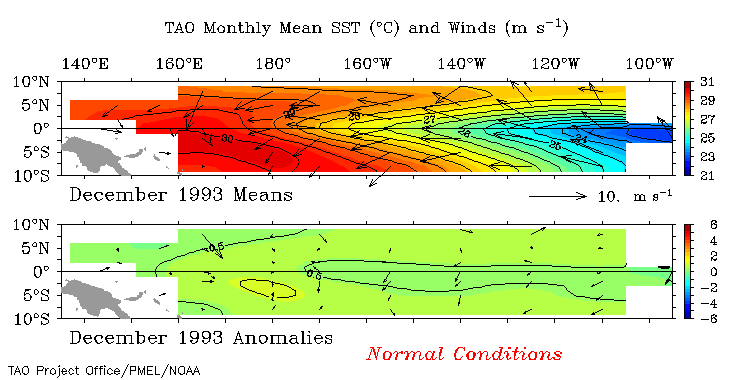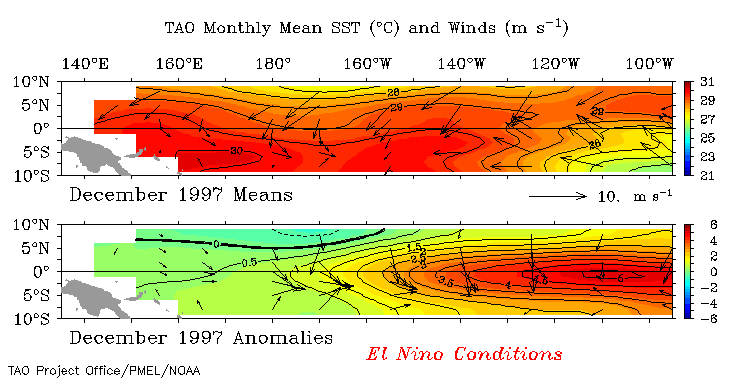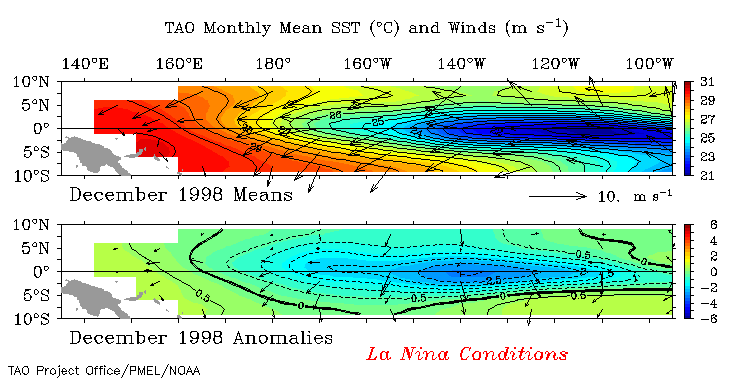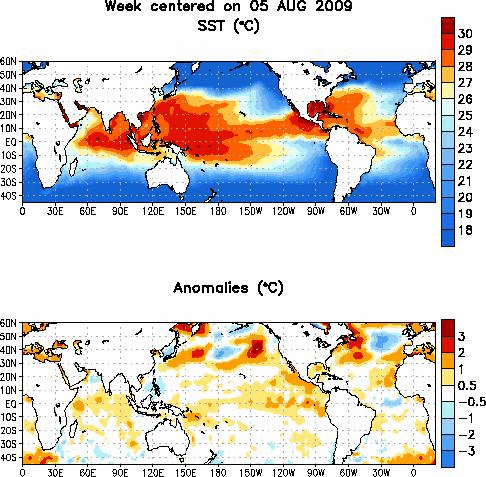| « GOP House leader says moderates wanted in party ?! | Brilliant column by Peggy Noonan! » |
How's that Man Made Global Warming / Climate Change Doing These Days?
Considering that many people predicted an increase in tropical cyclone activity and pointed to Global Warming; I would say we're doing great!
I'm no professor, but I did a post on Global Warming, El Nino and La Nina in January of 2008.
Here is what I had to say in January 2008:
Remember what happened in 2005? There was a very active record breaking hurricane season. Notice that the mean ocean temperature in the Atlantic was warmer in 2005 than they were the year before. The mean ocean temperature in the Pacific was cooler in 2005 than it was the year before. This year in 2006 there have been absolutely no hurricanes that made it to the east coast of the U.S. or the Gulf of Mexico. If you look at the mean temperatures of the Atlantic and the Pacific you will see that there has been a reversal in the temperatures. The Pacific nations have been hit by many damaging typhoons this year.
The weather patterns that have taken place are part of a global weather pattern that changes about every 5 years known as El Nino and La Nina. 'Both from the NOAA website' As you can see from these two definitions there is nothing man is doing to change this. This pattern has been happening since before man.
Here is what a professor at FSU had to say:
http://www.coaps.fsu.edu/~maue/tropical/
Ryan N. Maue's Seasonal Tropical Cyclone Activity Update
North Atlantic Hurricane Season slowest since 1997
Global and Northern Hemisphere Tropical Cyclone Activity remains near 30-year historical lows -- three years in a row now of considerably below-average activity globally.
Consequence of the transition from La Nina to El Nino during the past year
This is a natural consequence of the rather unusual flip from strong La Nina to El Nino conditions during the past calendar year, which did not happen at all during the period of 1976-2006 as indicated by the MEI-ENSO INDEX (LINK). It is expected by NOAA and others that the current-El Nino is locked in for the rest of winter 2009-2010 and may indeed strengthen. This would suggest enhanced typhoon activity in the Western Pacific throughout the rest of the fall and winter which will necessarily increase the NH ACE. The Southern Hemisphere TC season may begin at any time now, but most activity is experienced between January and March.
Let's assume that the (GW/CC Crowd) Global Warming / Climate Change Crowd is correct. At first, the GW/CC Crowd claimed that an increase in global temperatures would lead to increased sea surface temperatures, which would lead to an increased number of hurricanes. Yes, it was that simple. Now we are told that an increase in sea surface temperatures will cause an increase in the intensity of hurricanes, not necessarily the number of hurricanes. So, where are the increased number or higher intensity storms?
Let's see if there are any data to support the claims?
http://www.ucsusa.org/global_warming/science_and_impacts/science/hurricanes-and-climate-change.html
The Effect of Global Warming
Two factors that contribute to more intense tropical cyclones-ocean heat content and water vapor-have both increased over the past several decades. This is primarily due to human activities such as the burning of fossil fuels and the clearing of forests, which have significantly elevated carbon dioxide (CO2) levels in the atmosphere. CO2 and other heat-trapping gases act like an insulating blanket that warms the land and ocean and increases evaporation. (7)
The world's oceans have absorbed about 20 times as much heat as the atmosphere over the past half-century, leading to higher temperatures not only in surface waters (e.g., depths of less than 100 feet) but also down to substantial depths, with the most severe warming occurring in the first 1,500 feet below the surface. (8,9) As this warming occurs, the oceans expand and raise sea level. This expansion, combined with the inflow of water from melting land ice, has raised global sea level more than one inch over the last decade. (10) In addition, observations of atmospheric humidity over the oceans show that water vapor content has increased four percent since 1970; because warm air holds more water vapor than cold air, these findings correlate with an increase in air temperature. (11,12)
Recent Scientific Developments
Higher ocean surface temperatures. Scientists have looked at potential correlations between ocean temperatures and tropical cyclone trends worldwide over the past several decades. A 2005 study published in the journal Nature examined the duration and maximum wind speeds of each tropical cyclone that formed over the last 30 years and found that their destructive power has increased around 70 percent in both the Atlantic and Pacific Oceans. (13,14) Another 2005 study, published in the journal Science, revealed that the percentage of hurricanes classified as Category 4 or 5 (based on satellite data) has increased over the same period. (15) The findings from both studies correlate with the rise in sea surface temperatures in regions where tropical cyclones typically originate.
Researchers in a 2006 study (also published in Science) found, upon reanalyzing early storm track records with modern techniques, that a few category 4 and 5 tropical cyclones may have previously been underestimated. (16) However, it remains to be seen if enough storms would be reclassified to challenge the overall rise in intensity. A 2006 study published in Geophysical Research Letters, relying not on storm track records but on global surface wind and temperature records between 1958 and 2001, confirmed the trends identified in the two 2005 studies above and found that a 0.45 °F (0.25 °C) increase in mean annual tropical sea surface temperature corresponded to a 60 percent increase in a tropical cyclone's potential destructiveness. (17)
So this report from The Union of Concerned Scientists seems to support the claim that increased sea surface temperatures result in stronger tropical cyclones (hurricanes in our case). So why has this year (2009) been so quite?
Remember El Nino and La Nina refer to sea surface temperatures in the Pacific NOT the Atlantic. When the Pacific is warmer the Atlantic is cooler, when the Pacific is cooler the Atlantic is warmer. El Nino represents a warming trend in the Pacific. La Nina represents a cooling trend in the Pacific.
These images are from NOAA's El Nino and La Nina description pages. Remember these represent Pacific sea surface temperatures.



So, why so few hurricanes? Why have the storms been so weak?
Sea surface temperatures in the tropical Atlantic are decreasing, not increasing. Take a peek:

This is the precise reason that so many of the GW/CC Crowd are trying to get legislation passed right now, as quickly as possible (Cap and Trade). They know that with every year of reduced cyclone activity and intensity their scare tactics are proven fraudulent.
Remember the dire predictions from the 1970s. There was going to be another ice age for crying out loud! Based on what was predicted back then, we should be in an ice age right now.
Based on the science from the 1970s and now, We could conclude that: We stopped the coming of the next ice age with all of our green house gasses! ;) Think of all of the lives that were saved...
The fact is that the weather patterns are what they are. They were happening for thousands of years prior to any industrialized era. When you read into the science the conclusions are riddled with, "No direct cause has been found," or "Research into this area is ongoing."
Given this, why would any government want to pass legislation that would have a massive negative impact on the economy, all based on conjecture? Even more so, why would government want to pass legislation that could hurt the economy during a recession?
Perhaps that is why the administration is coming out saying that the recession is over, when in fact the economic downturn seems to be worsening. No one believes things are getting better, where are the jobs? Beware of the term recession. The term recession is strictly an economic term, it has nothing to do with job creation.
Damn Global Warming! Global Warming has caused a cooling trend in the tropical Atlantic and is causing snow storms in the northern U.S.!
Note: You DO NOT need to register to leave a comment.